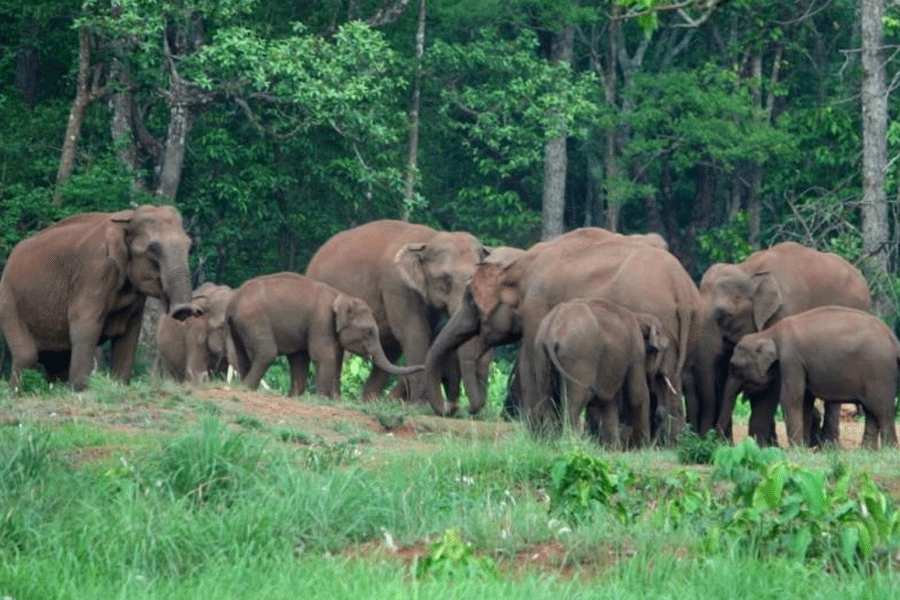Kerala Grapples with Escalating Human-Animal Conflicts Amidst Political Tensions
Calls for Legislative Amendments Intensify as Wildlife Encroachments Cause Tragedy and Economic Losses

Kerala's hills and forested districts are home to calm scenery and abundant flora, but in recent months, a worrisome story has emerged: a rise in human-animal confrontations has left a trail of death, injury, and rising economic losses in their wake.
In the past three months, at least nine people have died in the districts of Idukki and Wayanad, and many more have been hurt in wildlife attacks, mainly by tigers, elephants, and wild boars, among other animals.
Elephants and wild boars that wander into agricultural regions from woods have sadly resulted in maulings of livestock and beloved pets, leaving farmers devastated and discouraged.
The matter has gained significant attention ahead of the 2018 Lok Sabha elections as the state struggles to deal with these unfortunate occurrences.
The Wildlife (Protection) Act of 1972, which is included in the concurrent list, is being changed by the ruling Left Democratic Front (LDF) and the opposition United Democratic Front (UDF), which is governed by the Congress. They contend that in order to address the rising number of human-animal conflict events, modifications are required.
The BJP-led federal government, on the other side, argues that the Act's current provisions are adequate to deal with situations in which wild animals are attacked.
The Kerala Assembly passed a resolution on February 14 urging the Center to revise the Act and streamline the processes for dealing with wild animals that endanger human life and property in light of the current spike in human-animal conflict.
Kerala wants to change Section 11(1)(A) of the Act to give Chief Conservators of Forests jurisdiction instead of Chief Wildlife Warden, making it simpler to handle wild animals that represent a threat to human safety.
In an interview with PTI, Joice George, an LDF candidate running for the next Lok Sabha elections and a former MP from Idukki, stated that maintaining the prey-predator balance is crucial to the long-term sustainability of the ecology and wildlife.
With reference to a number of global studies, such as those conducted by the Intergovernmental Science-Policy Platform on Biodiversity and Ecosystem Services (IPBES), the Left candidate stated that "kill to conserve" is a part of sustainable wildlife management. "The culling technique may be used if the number of wildlife rises. Not only is it to lessen human-animal conflict, but it's also better for ecology, forests, and conservation," George asserted.
He claimed that the state's Left-led administration has made aggressive steps to lessen the friction between people and animals.
Although the Center thinks that the regulations as they are now are adequate, George emphasized the need of sustainable wildlife management and acknowledged the need for procedure simplification to lessen human-animal conflict.
Samshad Marakkar, the president of the Wayanad district panchayat and a congressman, emphasized the importance of modernizing legislation to reflect the times. He criticized the federal and state administrations for their "irresponsible" management of animal concerns. Not just in the Wayanad but also in other districts with woods, this will be a topic of discussion during the next election. People require a tranquil existence. The Congress leader declared, "They will undoubtedly vote for those who take proactive measures to protect their lives."
Marakkar demanded an amendment to streamline the convoluted legal processes associated with tranquilizing or culling wild animals, claiming that the Forest Department is underfunded and does not have the tools needed to manage them.
In addition to political parties, the growing number of human-animal clashes has disturbed the Catholic Church, especially the Idukki diocese of Syro-Malabar church. In the last two months alone, at least six deaths have occurred in the hill district, leading the church to contemplate agitation.
The church requested that the government give the people the authority to exterminate the troublesome species rather than adding more red tape to the bureaucracy.
"The wild boars can now be killed by the panchayats. However, we must obtain permission from the relevant authorities to either capture or kill wild boars when they assault someone. It's not feasible because by the time the procedures are finished, it might have attacked someone else or harmed crops," said Fr. Jins Karackattu, the Idukki diocese's Director of the Media Commission.
He said that the current law from 1972 is no longer relevant and that it is the duty of the federal and state governments to find a long-term solution to the problem.
Drawing on recent modifications that emphasize comprehensive protection for residential areas, the ruling BJP at the Centre feels that the current law already permits dealing with wild animals posing a threat to humans.
"A current law is in place. The Minister of Union Forests had said unequivocally that measures exist for the killing of wild animals. George Kurien, the state general secretary of the BJP, told PTI that "the state government is finding some lame excuses, but they are unable to implement the law."
He asserted that if the state administration lacks the will to put the amendments into effect, then they are meaningless.
The state administration, according to Fr Kuriakose Vellachallil, a local priest at a church in Wayanad, and a relative of Paul, a forest watcher who was killed in a recent wild elephant attack, was not prepared to put the current law into effect.
"If a wild animal enters human habitat and poses a threat to human life, a central legislation permits the chief wildlife warden to order its slaughter. However, because this statute is included in the concurrent list, the state government is not prepared to use it, according to Vellachallil. However, to keep the increasing number of wild animals under control, an update to the Act was required.
Despite complaints from community organizations and political parties over animal assaults, data from the state Forest Department indicates that there are still an equal number of wild animals in Kerala and the surrounding forest areas.
Furthermore, because animals migrate, forest officials claim it is difficult to gather state-specific population data.
Except for the headline, this story has not been edited by Press Time staff and has been published from a syndicated feed.























































